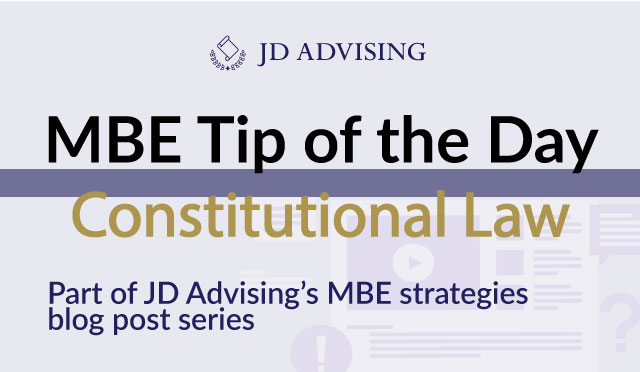MBE Tip of the Day: Constitutional Law
MBE Tip of the Day: Constitutional Law
Welcome to our MBE tip of the day series. This “MBE tip of the day” post focuses on constitutional law.
You will see 25 scored constitutional law MBE questions on the Multistate Bar Exam. In this post, we will review a constitutional law question together. Note that we have posted several MBE tips (which you can find links to at the bottom of this post) that focus on a specific multiple-choice question that many students answer incorrectly. If you can master these questions, it could increase your MBE score by that many points if you see any of these issues tested again (which, by the way, you will!). These posts of MBE tips and tricks will not only cover substantive law but also strategy. So each “MBE tip of the day” post covers one highly-tested area of substantive law as well as an important MBE strategy. You can sign up to receive these posts directly to your inbox for the upcoming administration at the bottom of this page.
MBE Tip of the Day: Constitutional Law
MBE Tip of the Day Instructions:
Do your best to answer this constitutional law MBE question (before even looking at the answer choices and before looking at the answer below!) Ask yourself: What is the subject? What is the legal issue? What is the rule and analysis? What is the conclusion? Try to answer these beginning questions before even reading the answer choices. Then, uncover the answer as well as read more about our MBE tip of the day.
Show the MBE Question...
Constitutional Law MBE Question
A recent deluge of rain in State A left the ground very unstable. In an effort to protect against infrastructure problems, Congress passed a law imposing a strict maximum weight for all shipping trucks attempting to enter State A on its toll highways. This weight was lower than the weight limit of any of the surrounding states. Companies that operated solely in State A were unburdened as they did not pass through the weighing checkpoints. However, companies that utilize shipping trucks that drive through State A were forced to either drive around State A or lessen their loads in order to pass through the state. A business in State B decided to challenge this law.
Which of the following arguments would be the business’s best argument that the law is unconstitutional?
(A) The law imposes an unreasonable burden on interstate commerce.
(B) The law discriminates against out of state citizens in violation of Article IV.
(C) The law is not necessary and narrowly tailored to serve a compelling governmental interest.
(D) The law is not rationally related to a legitimate governmental interest.
Subject:
Legal Issue:
Legal Rule and Analysis:
Choose an answer choice that most closely matches your conclusion and explain why the others are incorrect:
Show the Answer to the MBE Question...
Answer to the Constitutional Law MBE Question
Subject: Constitutional Law
Legal Issue: Congressional Powers and Equal Protection
Legal Rule and Analysis: Congress has the power to regulate the channels and instrumentalities of interstate commerce, persons and things in interstate commerce, or anything that has a substantial effect on interstate commerce. If a congressional law treats a person or a class of persons differently, it will be subject to review under the Equal Protection Clause of the 5th Amendment. If the discrimination is on the basis of a fundamental right or singles out a suspect class, the law will be subject to strict scrutiny. If the law discriminates against a quasi-suspect class, the law will be subject to intermediate scrutiny. If the law discriminates on the basis of any other classification, the law will be subject to rational basis analysis.
In this case, the federal government has the ability to regulate the weight of trucks that travel on the roads. Roads are instrumentalities of interstate commerce. Congress has broad authority in this area – in effect it can regulate nearly anything economic in nature. However, the law does expose a certain classification of companies to a regulation that others are not subject to. Companies who operate shipping trucks only in State A will not be affected by the weight requirement, while companies whose shipping trucks seek to cross the State A border will. There is no fundamental right or suspect class implicated by this classification. Thus, the law will be subject to the rational basis analysis. To withstand rational basis, the law must be rationally related to a legitimate governmental interest. It is very difficult for the plaintiff to succeed on this standard. However, it is the most appropriate argument for the company in State B to put forth.
Conclusion: The State B company should attempt to argue that the law is not rationally related to a legitimate governmental interest.
Look at the answer choices provided. Choose an answer choice that matches your conclusion. Review the other answer choices provided. The answer choice (D) is therefore correct. (A) is incorrect because Congress was the one that enacted this law and Congress has the authority to regulate interstate commerce. It is the states that are prohibited from unreasonably burdening interstate commerce. If State A had passed this law, this is the standard that would be used. (B) is incorrect because the Article IV Privileges and Immunities Clause prevents the states from discriminating against out of state citizens. This article does not apply to the federal government. (C) is incorrect because this is the standard that would be used if the federal government was discriminating on the basis of a fundamental right or against a suspect class. Imposing a burden on companies who seek to send shipping trucks into State A does not rise to that level. Therefore strict scrutiny is not appropriate.
MBE Tip: Pay attention to which entity is acting! Congress is allowed to pass laws that the states would not be permitted to. If you miss-identify which entity is acting, then you will have a much more difficult time identifying what challenges could be made. When you are reading the fact pattern, pay close attention to whether Congress is passing a law or whether a state is passing a law.
Show Summary of the Two Key Takeaway Points for the Day
Key Takeaways and MBE Tips From Prior Posts
Takeaway for the Law: Congress has the authority to regulate interstate commerce, but it will still be subject to equal protection challenges if it discriminates against classes.
MBE Tip: Pay attention to what entity is attempting to act!
Want to See Past MBE Tip of the Day Posts?
If you would like to see “MBE tip of the day” posts from prior days, please check out all of our past MBE tip of the day archives here! We have several of them and we list them by subject!
Looking for additional MBE help?
If you are looking for MBE help, read our 10 expert MBE tips here. Check out our step-by-step guide to improving your MBE score, please review this post for an overview of tips. If you would like to have the next MBE tip emailed to you when we come out with another one, please fill out the form below.
MBE Tip of the Day
Seeking MBE Assistance?
Seeking MBE Assistance?
- 📘 MBE Guide: Equip yourself with our FREE expert-crafted bar exam and MBE guides.
- Free Bar Exam Resource Center: Discover top resources, articles, and free webinars led by renowned bar exam professionals.
Top Resources as Vouched by our Students:
- MBE One-Sheets: One of our most highly acclaimed bar exam supplements!
- Bar Exam Outlines: Our comprehensive and condensed bar exam outlines present key information in an organized, easy-to-digest layout.
- MBE Private Tutoring: Opt for personalized, effective strategies.
- On Demand Bar Exam Course: Comprehensive bar exam preparation.
- Bar Exam Crash Course and Mini Outlines: Acclaimed and effective for a quick refresher.
- MBE Mastery Class, Real MBE Questions, and MBE Guide: Elevate your MBE preparation with these high-quality MBE supplements!
🔥 NEW! Check out our Repeat Taker Bar Exam Course and get introduced to our unmatched platinum Guarantee Pass Program.





